Order any book mentioned, on sale, by clicking on the order form tab below. It takes you to our certified secure order form page at our Hearts & Minds bookstore’s website. Or, if you have questions, give us a shout at the “inquire” page. Thanks for reading our BookNotes column and for your interest in reading widely.
Let me just get something off my chest, for starters, so you understand.
I know I am not alone in admitting that I have had, and continue to have, great concerns — in today’s parlance, issues — with the history, legacy, reputation, and behavior of what might generally be called “the church.”
Christianity as a religion has brought many, many great blessings to the world, even as some representatives of the church have done great, great evil. There’s all manner of contemporary nastiness and rigid sorts of dogmatism and graceless legalism; we seem to know more about the unsavory stuff that happens in churches and denominations these days, and it often isn’t pretty. Only a fool would deny it. Throw in the unfortunate experience of many who find within the church a general lifelessness, an apathy about the world at large, and a lackluster practice of the faith’s demands and, well, it’s no wonder there are books like Lyons & Kinnaman’s Unchristian that offers data about how unchurched younger adults report that the first things they think of when thinking about Christians are, well, not particularly good.
Coming of age spiritual memoirs, testimonials of faith and doubt, have long been a staple of religious literature. I must restrain myself from a tangent here, but you know there are wonderfully-written books telling of writers who have been attracted to or departed faith. We have a lot of wonderful books in our memoir section here at the store;. They used to be more about coming to faith rather than the occasional story of leaving the fold; now it seems almost the other way around.
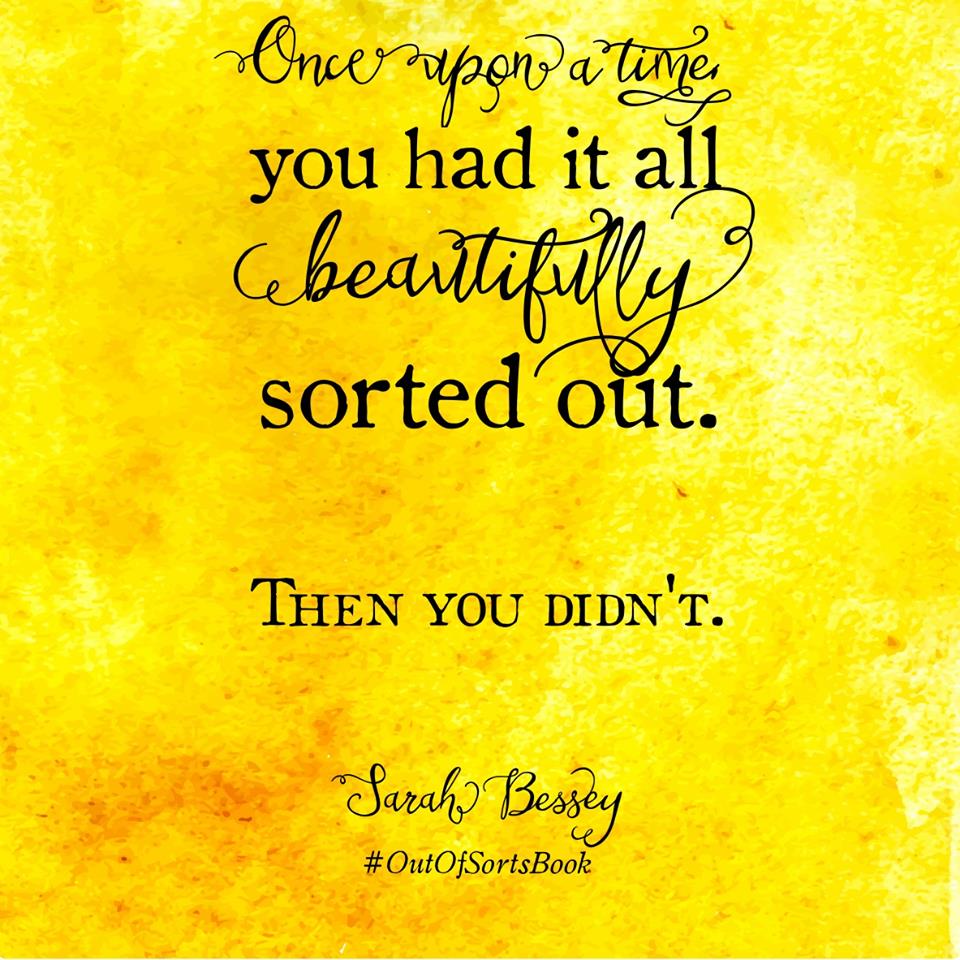 I have noticed in the last several years that there is a sub-genre of this kind of book and you surely know it too; I am referring to memoirs of former fundamentalists or evangelicals who have put pen to paper to tell of their growing disillusionment with the simple certainties of their youth, their frustrations with their old churches, books telling of faith journeys that end up perhaps still Christian (sometimes robustly so) but not quite of the sort they used to be. It really is a thing, nowadays.
I have noticed in the last several years that there is a sub-genre of this kind of book and you surely know it too; I am referring to memoirs of former fundamentalists or evangelicals who have put pen to paper to tell of their growing disillusionment with the simple certainties of their youth, their frustrations with their old churches, books telling of faith journeys that end up perhaps still Christian (sometimes robustly so) but not quite of the sort they used to be. It really is a thing, nowadays.
Many of these books are good reads, offering illumination about the paths life can take, the choices people make, the deepest things that grab or bless or hurt or shape us. Some are funny and entertaining (see Post Traumatic Church Syndrome: A Memoir of Humor and Healing by Reba Riley), some may be infuriating for those of us who don’t quite understand why some are so turned off by a little messiness in the church. Some such stories of becoming de-churched are luminously written without any proscriptive intent (think of the stunning In the Wilderness: Coming of Age in an Unknown County by Kim Barnes) while others (think of Searching for Sunday: Loving, Leaving and Finding the Church by Rachel Held Evans or Diana Butler Bass’s very thoughtful Strength for the Journey: A Pilgrimage of Faith in Community) are as much about their own visions for what good church should be like, with their well-told personal story the vehicle for lament, advocacy and pleas for reform.
And so, again, what I need to get off my chest: I get it. I, too, have issues, big issues, with lots of stuff within the Christian community, among high church liturgical types and low church evangelicals, among mainline denominational denominations and charismatic/Pentecostal ones. Indeed, I’ve spent time protesting church complicity in injustice — how many of you have been physically carted out of a church and how many of you have lost a beloved ministry job due to offering prophetic critique (or, have, while I’m airing my dirty laundry, been fired from a Family Christian bookstore for having a bit too much integrity?) Oh yes, I’ve got issues.
But yet, the other thing I need to say: I sometimes grow weary of the recent, hip negativity (what one friend has termed the “valorization of exile.”) And what’s with these big, broadly generic accusations about “Christians” (what Christians?) “the” church (which church?) I sometimes tire a bit of all the whining blogs and expose articles, earnest and beautifully written as many of them are. I am not so sure that venting all the youthful disillusionment with evangelicalism is all that helpful — interesting as the memoirs may be and valid as many of the concerns are — if they tend to make cynicism and being jaded more acceptable. As Rob Bell says in his powerful “Resurrection” video, “It’s easy to be cynical.”
Maybe I’m still too much of a baby boomer thinking we can change the world, or a do-gooder who thinks if you’re not part of the solution your part of the problem, but I want to note that I am sometimes surprised that evangelical young adults are surprised to learn the church is messed up. Sometimes I want to poke them in the chest and say who are you kidding: we all have some screws loose, no church is perfect, many of us have been wounded by harsh religion and your Captain Obvious story is getting old. Of course religion has been dysfunctional and of course we should be wary — haven’t you heard of the Crusades or the middle ages heresy hunting or the Salem Witch trials or Westboro Baptist? (For a good dose of healthy reality please pick up Forgive Us: Confessions of a Compromised Faith edited by Mae Cannon, Lisa Sharon Harper, Troy Jackson and Soong-Chan Rah.) Surely you know that many evangelicals just a handful of decades ago stood by silently while blacks were lynched by good Sunday school teachers. You are surprised that the church is sometimes awful and even on a good day, pretty messed up?
Still, I like that old saw (attributed to Augustine and used often by Dorothy Day) about how of course we know the church is a whore. But she is still our mother. And, I’d add, that means her members are still family to me. So watch out who you’re bitching about — those fundies, liberals, wackos, Pharisees, evangelicals, emergents, missionals, mainliners, liturgicals, mystics, Pentecostals, Calvinists, Arminians, Catholics, postmodern, legalistic, old school, new light, whoever else you don’t like these days — they’re my peeps, for better or worse.
And, anyway, for every goofball bad Christian and toxic church there are two good ones, devout, lovely folks, living out their faith in good and healthy ways, quiet, sober, kind. So the outrage I see on line sometimes makes me wonder if the aggrieved post-Christian prophets just don’t get out very much. If they did, they’d know this is true. There’s a lot of quiet beauty and gospel grace out there.
Maybe it would help if we all had a bit bigger, broader view of that abstraction: the church. I’d recommend reading my favorite book on ecumenism, Your Church is Too Small: Why Unity in Christ’s Mission is Vital to the Future of the Church by John H. Armstrong and a few memoirs about ordinary church life, something like Open Secrets: A Memoir of Faith and Discovery by Richard Lischer or When “Spiritual But Not Religious” is Not Enough: Seeing God in Surprising Places, Even the Church by UCC pastor and very good writer, Lillian Daniel. Maybe Eugene Peterson’s memoir,The Pastor. And, although it plays to the disillusioned and jaded looking for a way out of conventional church, Nadia Bolz-Weber’s Accidental Saints: Finding God in all the Wrong People made me weep with how ordinary her famously edgy church is in many, many ways — good but broken folks trying to love each other as they worship God and follow Jesus, through good outreach and lots of failings, too. Reading these stories of local church life gives me hope.
So, having said all that…
I will list 5 recent books that capture this trend, this movement, if you will, this genre of writing that often appears as memoirs of those moving away from older certainties and towards newer understandings and expressions of Christian faith. These are voices to hear, good books to read in part because they are indicative of something going on and because — as a bookseller, I truly believe this — they can be helpful as you consider your own faith journey, church involvements, loyalties and convictions, doubts and fears. Are you at peace about your own religious experiences? Disillusioned or hopeful? Have you emotionally grappled with and resolved some of the hard stuff you’ve encountered in your own church experience? Has your faith community discouraged asking hard questions or sharing doubt or are they safe and supportive and gracious? Are you on the cusp of new layers of insights — listen to your life, Fred Buechner said decades ago — and are you working through that in a local congregation? Do your questions about the Bible itself lead you to deeper study and good conversations? Agree or not with any of these 5 books and authors, they are notable and they offer enjoyable, engaging reading and can be useful to stimulate your own self reflection.
Next, after those 5 recommendations, I will list 5 new books of theology that, if I may be so bold, might be helpful for those asking the big questions about the meaning of faith and what it might look like to (re)consider Christian faith for our time.
That is, if one of the trends we see in these memoirs and reflective studies is a disillusionment with old ways of getting the faith described and lived, then what might a better way be? These five theology books are, in fact, mostly conventional. We need an ancient-future view, you know, not just throwing the baby out with the bath water and all that, historic stuff explained afresh. I’ve said it before — a wise teacher in art school once told students wanting to do abstract modern art that “you have to know the rules before you break them.” So I might suggest these books of fairly classic theology or faith formation to those attracted to the artful memoirs of faith and doubt written by those seeking different kinds of church experience. Before serious, life-giving re-formulation can happen, we have to know the basics. If we are pushing away from old stuff, we have to know where we’ve been and what direction to head. I sometimes wonder if the authors of these sorts of contemporary books narrating a theological shift had these kinds of strong resources, and were part of faith communities reading this kind of meaty, good stuff together, how their lives and faith might have worked out differently?
If you are familiar with these sort of questions and concerns, then you know what I’m talking about and you will appreciate these books, I’m sure. But if none of this seems familiar to you and you aren’t a part of these kinds of conversations at all, perhaps these few titles and authors might be useful to alert you to the pain some feel about their churches and the struggles some have with conventional expressions and formulations of a faith. Welcome….
FIVE SPIRITUAL MEMOIRS OR REFLECTIONS ON NEW KINDS OF FAITH
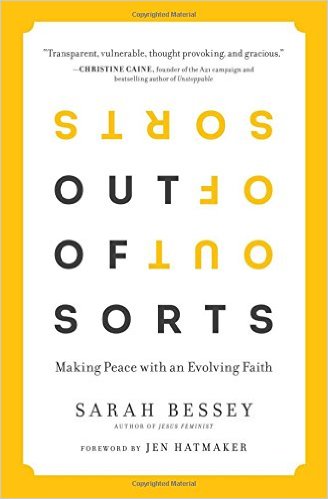 Out of Sorts: Making Peace with an Evolving Faith Sarah Bessey (Howard) $15.99 I very much liked Bessey’s last book, Jesus Feminist and really appreciate her thoughtful, creative writing style. I think Jen Hatmaker is right when she says “Sarah Bessey manages to be poetic but accessible, prophetic but gentle, crazy smart but approachable, strong but gracious.” She is in some ways a poster-child for this trend about moving beyond simple and dogmatic theological views and practices from her previous evangelical background. Like she says, her faith is evolving. In many ways, it is a lovely thing to behold.
Out of Sorts: Making Peace with an Evolving Faith Sarah Bessey (Howard) $15.99 I very much liked Bessey’s last book, Jesus Feminist and really appreciate her thoughtful, creative writing style. I think Jen Hatmaker is right when she says “Sarah Bessey manages to be poetic but accessible, prophetic but gentle, crazy smart but approachable, strong but gracious.” She is in some ways a poster-child for this trend about moving beyond simple and dogmatic theological views and practices from her previous evangelical background. Like she says, her faith is evolving. In many ways, it is a lovely thing to behold.
Of this recent release Micah Boyett (author of Found) says, “Bessey writes with the fire of a preacher and the soul of a mother, critical thought without cynicism. This book is for all of us wonderers who long for Jesus and distrust easy answers.” See what I mean?
The very lovely writer Shauna Niequist mentions s “complicated dance with church and all its tentacles…” Check. Brian Zahd (who himself has a book about his own out of sorts journey, self-published and not available to us) says that Bessey is sharing “her search for an authentic Christian faith — a search that led her away from the church and then back home again.”
Bessey’s Out of Sorts is a beautiful book and the title and the subtitle itself evoke much of what it is about. Frank Viola says it is “honest, sober” and Pete Enns says it is “moving and real.” I highly recommend it and think it captures exactly what many, many, formerly evangelical young adults are thinking and feeling. You should read it.
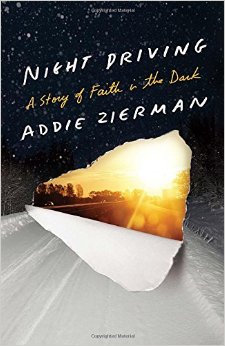 Night Driving: A Story of Faith in the Dark Addie Zierman (Convergent Books) $14.99 I cannot wait to read this new one — I loved her very moving memoir, a quintessential example of this genre, called When We Were On Fire (which I reviewed at BookNotes and which Publishers Weekly named as one of the top five religious books of 2013.) Rachel Held Evans says, correctly, that Zierman is “a master storyteller” and, whewie, is she ever! She can turn a phrase and pull you into a scene. Having dipped in to just a few pages, I know it will be a great read.
Night Driving: A Story of Faith in the Dark Addie Zierman (Convergent Books) $14.99 I cannot wait to read this new one — I loved her very moving memoir, a quintessential example of this genre, called When We Were On Fire (which I reviewed at BookNotes and which Publishers Weekly named as one of the top five religious books of 2013.) Rachel Held Evans says, correctly, that Zierman is “a master storyteller” and, whewie, is she ever! She can turn a phrase and pull you into a scene. Having dipped in to just a few pages, I know it will be a great read.
Here is the gist of this important new memoir: Zierman grew up with an emotionally-charged, fire-filled sort of faith that seemed so very real because one felt God’s touch. But now, at age 30, she tells us, she feels nothing. “Just the darkness pressing in. Just the winter cold. Just a buzzing silence where God’s voice used to be.” The organizational structure of this is a road trip — she piles her two kids into the minivan and heads South in a last-ditch effort to find Light in the darkness. Each chapter is a different leg of the literal journey.
I love a good road trip and I love a memoir ruminating on finding faith, searching for lasting answers, meaning, hope. I think this fine writer, blogger, and speaker will deliver what I suspect is a beautifully-rendered sequel to her moving away from fundamentalism story told in When We Were on Fire. I think it is going to get a lot of attention. Enjoy.
 The Sin of Certainty: Why God Desires Our Trust More Than Our “Correct” Beliefs Peter Enns (HarperOne) $25.99 I sort of thought most people knew this by now, but apparently not: “having the right beliefs is not the same as having faith.” If one is going to ruminate on the relationship between right belief and right behavior and the good life, Enns is a good choice to lead us in pondering this. He is a top flight Old Testament scholar, and formerly taught at the exceptionally theologically conservative and doctrinally rigid Westminster Theological Seminary where he lost his job by asking questions about the doctrines of innerrency and how to handle responsible criticism of the discrepancies in ancient Biblical manuscripts that seemed out of line with their own heritage. Dr. Enns has written serious books about all that (Inspiration and Incarnation: Evangelicals and the Problem of the Old Testament) and more popular level books about how to read the Scriptures well, such as The Bible Tells Me So: Why Defending Scripture Has Made Us Unable to Read It. But through and behind his story of being fired for what some might think to be fairly moderate theological positions, there is this bigger question: what is the role of rational truth in Christian faith, and what is the role of orthodox doctrine? What does it mean to know? And what kind of trust (and in what?) does faith demand? The Sin of Certainty is a very readable collection of fairly short chapters with insights from Enns’s own journey, his reflections on his own evolving views of the Bible and Reformed evangelicalism, and how these shifts have effected his own family, work, life, and church involvement.
The Sin of Certainty: Why God Desires Our Trust More Than Our “Correct” Beliefs Peter Enns (HarperOne) $25.99 I sort of thought most people knew this by now, but apparently not: “having the right beliefs is not the same as having faith.” If one is going to ruminate on the relationship between right belief and right behavior and the good life, Enns is a good choice to lead us in pondering this. He is a top flight Old Testament scholar, and formerly taught at the exceptionally theologically conservative and doctrinally rigid Westminster Theological Seminary where he lost his job by asking questions about the doctrines of innerrency and how to handle responsible criticism of the discrepancies in ancient Biblical manuscripts that seemed out of line with their own heritage. Dr. Enns has written serious books about all that (Inspiration and Incarnation: Evangelicals and the Problem of the Old Testament) and more popular level books about how to read the Scriptures well, such as The Bible Tells Me So: Why Defending Scripture Has Made Us Unable to Read It. But through and behind his story of being fired for what some might think to be fairly moderate theological positions, there is this bigger question: what is the role of rational truth in Christian faith, and what is the role of orthodox doctrine? What does it mean to know? And what kind of trust (and in what?) does faith demand? The Sin of Certainty is a very readable collection of fairly short chapters with insights from Enns’s own journey, his reflections on his own evolving views of the Bible and Reformed evangelicalism, and how these shifts have effected his own family, work, life, and church involvement.
Sarah Bessey says,
Enns is brilliant. This book is accessible, freeing, empowering, and beautiful. I underlined almost every page. I’m deeply thankful for Enns’s work and his new book is right on time for many of us.
Brian McLaren says of The Sin of Certainty,
If you’re afraid that your theological questions and doubts disqualify you from being a person of faith, theologian Peter Enns has good news for you. Very good news. And it’s a delightful read, too!
And there is a lot of Bible study here. Walter Brueggemann notes professor Enns’s “puckish affirmation of the buoyant, sometimes outrageous, boundary-breaking capacity of biblical faith.”
There are other resources for this journey — I love books like Daniel Taylor’s IVP release The Myth of Certainty: The Reflective Christian and the Risk of Commitment or his novel, for that matter, published by Slant, called Death Comes for the Deconstructionist. Enns is not alone in deconstructing certain reductionistic ways of knowing and promoting more faithful, storied ways of understanding God’s authoritative revelation, and he explains how this debate about the roots of Western culture has been “festering for centuries.” Anyway, The Sin of Certainty: Why God Desires Our Trust More Than Our “Correct” Beliefs — puckish as it may be — is an important new release, part behind the scenes personal story and part seminar on thinking about church, Bible, discipleship and true faith. Fascinating.
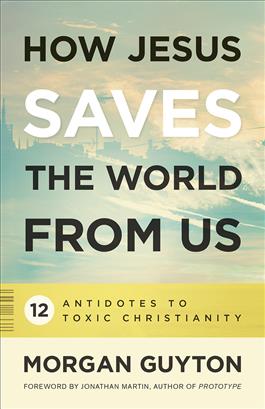 How Jesus Saves the World From Us: 12 Antidotes to Toxic Christianity Morgan Guyton (Abingdon) $16.00 Okay, this is less of a memoir and more of a Biblical/theological church revitalization study, and the author (a United Methodist elder and campus minister) surely doesn’t intend to merely bad-mouth the church, inviting doubt and celebrating exile from institutional religion. No, he’s all in. But his take is edgy and critical. And really interestingly written, in what Diana Butler Bass says is “Powerful. Provocative. And true…” She continues, “if you’ve been tempted to dump Christianity, give this book the chance to convert you to the possibility of a deeper life in and with God.”
How Jesus Saves the World From Us: 12 Antidotes to Toxic Christianity Morgan Guyton (Abingdon) $16.00 Okay, this is less of a memoir and more of a Biblical/theological church revitalization study, and the author (a United Methodist elder and campus minister) surely doesn’t intend to merely bad-mouth the church, inviting doubt and celebrating exile from institutional religion. No, he’s all in. But his take is edgy and critical. And really interestingly written, in what Diana Butler Bass says is “Powerful. Provocative. And true…” She continues, “if you’ve been tempted to dump Christianity, give this book the chance to convert you to the possibility of a deeper life in and with God.”
Listen to the back cover, noting not only how good and needed this is, but how it seems to capture something of this tendency these days to be critical of the church, to seek antidotes for toxic behaviors and bad attitudes.
It says,
Christianity has always been about being saved. But what Christians need saving from most today is the toxic understandings and behaviors we ourselves have been practicing! We have become precisely that Jesus came to stop us from being.
This is a book for Christians who are troubled by what we’ve become and who want Jesus to save us from the toxic behaviors and attitudes we’ve embraced.
This book with the interesting title, How Jesus Saves the World From Us: 12 Antidotes to Toxic Christianity, offers ways to more faithfully participate in God’s redemptive work. It reminds us that “there are many reasons to lose hope about the state of our world and our church” but invites us to not give in or give up, but to rethink faith (“poetry not math”), worship (it’s “not performance”), church (“temple, not program”) and service (“solidarity, not sanctimony”) and live afresh into lives that are about “communion, not correctness.”
I’m sure you can see ways in which some of these slogans perhaps need not be “either/or” and how in some places, some of Guyton’s accusations in the hard-hitting How Jesus Saves the World… may seem ham-fisted. But, mostly, I suspect he’s right and these antidotes are not only indicative of things the Spirit is saying to us these days, but of stuff we really need to ponder. Guyton has seen young adults drift from faith for some of these very reasons; he’s obvious familiar with the data shown in UnChristian and knows about the anguish and discomfort many feel with what they know about church. This is his response.
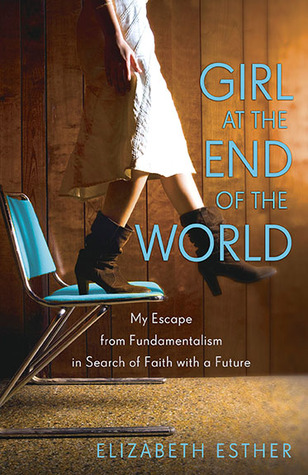 Girl at the End of the World: My Escape from Fundamentalism in Search of Faith with a Future Elizabeth Esther (Convergent Books) $14.95 This book came out two years ago so is not brand new, but it is such a great and moving read and such a clear example of toxic faith from which she does indeed need to escape and be healed that I wanted to list it here. She tells a very moving tale about her upbringing — secret family plans to be “rapture ready”, abusive “child training” stuff, being forced to preach fire and brimstone on street-corners as a child — that seems bizarre to most readers. Esther journeys through what can only be called PTSD and the realization that the authoritarian religion she knew was nearly cult-like, beyond the scope of most conservative evangelicals, for sure, and simply not healthy or true.
Girl at the End of the World: My Escape from Fundamentalism in Search of Faith with a Future Elizabeth Esther (Convergent Books) $14.95 This book came out two years ago so is not brand new, but it is such a great and moving read and such a clear example of toxic faith from which she does indeed need to escape and be healed that I wanted to list it here. She tells a very moving tale about her upbringing — secret family plans to be “rapture ready”, abusive “child training” stuff, being forced to preach fire and brimstone on street-corners as a child — that seems bizarre to most readers. Esther journeys through what can only be called PTSD and the realization that the authoritarian religion she knew was nearly cult-like, beyond the scope of most conservative evangelicals, for sure, and simply not healthy or true.
Sarah Mae, a fine writer of books for women, whose work we appreciate, says,
Elizabeth shares with candor, wit, and near flawless writing about the religion she was so deeply hurt by. Her story is heartbreaking, yet redemptive, and we would all do well to pay attention to how religion without the love, grace, and truth of Jesus Christ is an empty and destructive force.
I greatly appreciate Rachel Held Evans evaluation:
What a story! Girl at the End of the World is witty, insightful, courageous, and compelling, the sort of book you plan to read in a week but finish in a day. Elizabeth Esther is a master storyteller who describes her journey out of fundamentalism with a powerful mix of tenderness and guts. With this debut, Esther sets herself apart as a remarkable writer and remarkable woman. This book is a gift, and I cannot commend it enough.
It isn’t a foregone conclusion in Girl at the End… nor in any of these stories, that there will be anything like renewed faith or healing or hope. Thankfully, Elizabeth Esther does experience great grace and displays even good humor in her masterful prose. We see the cowering girl who finds great awareness of God’s love and a more life-giving faith.
FIVE NEW THEOLOGICAL RESOURCES
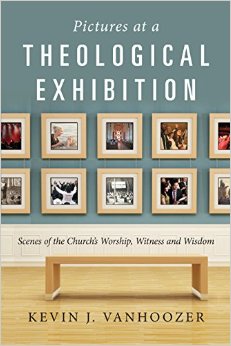 Pictures at a Theological Exhibition: Scenes of the Church’s Worship, Witness and Wisdom Kevin J. Vanhoozer (IVP Academic) $20.00 I love the look of this, the format, the metaphor, which Vanhoozer creatively plumbs throughout. It might become — it just came so I can’t say for sure — my favorite theology book of the year. It sure looks meaty and fun, edifying and interesting.
Pictures at a Theological Exhibition: Scenes of the Church’s Worship, Witness and Wisdom Kevin J. Vanhoozer (IVP Academic) $20.00 I love the look of this, the format, the metaphor, which Vanhoozer creatively plumbs throughout. It might become — it just came so I can’t say for sure — my favorite theology book of the year. It sure looks meaty and fun, edifying and interesting.
I’ll let Marva Dawn say it:
I have always loved Pictures at an Exhibition, but the music and the art, and now that Vanhoozer has structured his theology book according to its promenade and galleries, I will remember his descriptions and clarifications that much better. He is a meticulous explainer, so his work in tis book is very unambiguous as he reckons with many issues such as the role of a pastor interpreting a text, the affective relation doctrine and worship, and debate about cognitive enhancement. Then there is the added prevention of his artistic sermons. Don’t miss this display!
One has to appreciate a book that somebody like Cornelius Plantinga says is “deeply revealing” and is written “with enormous discernment and love.”
Besides this walk through the exhibition hall, teaching about applied theology (“the church’s worship, witness, wisdom”) there are sermons interspersed as well. This truly is a great plus.
Listen to Fred Sanders of Biola University:
Vanhoozer has a reputation for unveiling the big picture for us, but here he devotes his considerable critical powers to a series of small ones. For fans of his earlier work, there are characteristic delights and a few surprises–not least the interspersed sermons that answer the question, ‘Yes, but will it preach?’ Vanhoozer’s playfulness, recursions, puns and layered allusions all pay off exceptionally well in these miniature studies. And readers who have heard that Vanhoozer’s theology deserves attention but have wondered where to begin studying are well advised to start with these rich and accessible essays.
One reviewer — knowing Vanhoozer’s own interest in theatre and drama — calls this book an artful picture/play. Still, though, it is mature, faithful, seriously orthodox theology. Oh if only seekers and skeptics and shallow preachers alike would commit to doing this kind of good reading. We could recover what Vanhoozer calls our “discarded imagination” and recovery a theological vision that serves the church, enhances the lives of the people of God.
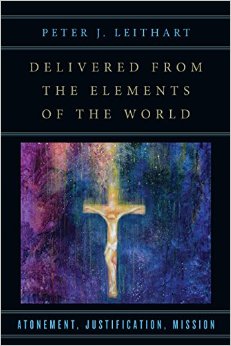 Delivered from the Elements of the World: Atonement, Justification, Mission Peter J. Leithart (IVP Academic) $30.00 I have got to read this big book before selling books at an event with professor Leithart at a Mercersburg Theology conference in Lancaster later this Spring. It is mature and meaty, not unlike his many other serious books. He is the president of Theopolis Institute in Birmingham, Alabama and an adjunct senior fellow at New Saint Andrews College; perhaps you read him at First Things. His is, by all accounts, brilliant, a serious Biblical scholar who is at once utterly orthodox and yet a bit unconventional, feisty and remarkable.
Delivered from the Elements of the World: Atonement, Justification, Mission Peter J. Leithart (IVP Academic) $30.00 I have got to read this big book before selling books at an event with professor Leithart at a Mercersburg Theology conference in Lancaster later this Spring. It is mature and meaty, not unlike his many other serious books. He is the president of Theopolis Institute in Birmingham, Alabama and an adjunct senior fellow at New Saint Andrews College; perhaps you read him at First Things. His is, by all accounts, brilliant, a serious Biblical scholar who is at once utterly orthodox and yet a bit unconventional, feisty and remarkable.
I can best recommend this to you, and assure you of its importance, by offering these three breathtakingly good endorsements by three very important scholars. Few books get this kind of acclaim:
When you read Peter Leithart, you suddenly realize how timid most Christian theologians are, tepidly offering us a few ‘insights’ to edify our comfort with the status quo. Leithart is like a lightning strike from a more ancient, more courageous Christian past, his flaming pen fueled by biblical acuity and scholarly rigor. In this book, he does it again–here is the City of God written afresh for our age, asking a question you didn’t know to ask but now can’t avoid: Why is the cross the center of human history? Couldn’t God have found another way? Leithart’s answer–this book–is a monumental achievement.”
–James K. A. Smith, professor of philosophy, Calvin College, editor, Comment magazine
“Among contemporary theologians, only Leithart has the biblical erudition, theological breadth and rhetorical power necessary for writing a book like this one. His Christian creativity and love for Jesus Christ jump off the page. As an account of atonement, this book is also an account of the entirety of Christian reality, and indeed of the reality of Israel as well, in light of pagan and secular cultures and in light of the church’s own failures to live what Christ has given. At its heart is an urgent call for all Christians, living in the Spirit, to share the Eucharist together against every fleshly barrier and Spirit-less form of exclusion. Leithart’s dazzling biblical and ecumenical manifesto merits the closest attention and engagement.”
–Matthew Levering, Perry Family Foundation Professor of Theology, Mundelein Seminary
“Peter Leithart is one of our best and most creative theologians. In this wide-ranging book Leithart shows that doctrine is not some abstract entity disconnected from contemporary life but is in fact deeply relevant and pregnant with social and political insights. Leithart is biblically, theologically and culturally literate–a rare combination–and thus able to produce the sort of work we so badly need today. Attending to the doctrines of the atonement and justification, he writes in the best tradition of apologetics, namely that of creative, orthodox, contextual theology.”
–Craig Bartholomew, professor of philosophy and religion and theology, Redeemer University College
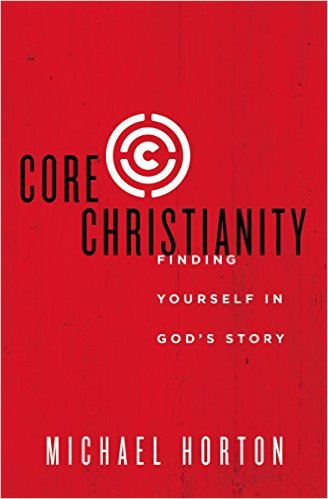 Core Christianity: Finding Yourself in God’s Story Michael Horton (Zondervan) $14.99 Okay, this is a different sort of book than the first two listed. While Horton is a remarkable scholar, writer, journalist and radio host (see his White Horse Inn broadcast) himself and while he has written serious, mature books about the troubles of even the evangelical church for drifting from robust, serious theology, this book is not designed for heady thinkers and certainly not for the academy or scholars. It is simply what we believe and why it matters — an intro to the study of God that leads to awe and wonder and clarity about grace and our response to it all. Horton shows his pastoral side here and tackles, as it says on the back cover “the essential and basic beliefs that all Christians share. In addition to unpacking these beliefs in a way that is easy to understand, Horton shows why they matter to our lives today.
Core Christianity: Finding Yourself in God’s Story Michael Horton (Zondervan) $14.99 Okay, this is a different sort of book than the first two listed. While Horton is a remarkable scholar, writer, journalist and radio host (see his White Horse Inn broadcast) himself and while he has written serious, mature books about the troubles of even the evangelical church for drifting from robust, serious theology, this book is not designed for heady thinkers and certainly not for the academy or scholars. It is simply what we believe and why it matters — an intro to the study of God that leads to awe and wonder and clarity about grace and our response to it all. Horton shows his pastoral side here and tackles, as it says on the back cover “the essential and basic beliefs that all Christians share. In addition to unpacking these beliefs in a way that is easy to understand, Horton shows why they matter to our lives today.
Horton is J. Gresham Machen Professor of Systematic Theology and Apologetics at Westminster Seminary in California so comes at this as a stanch advocate of the Reformed tradition. Yet, on the back, non-reformed authors (such as Scot McKnight) offer good recommendations. Kelly Kapic says it affords readers a change to “learn from a master who is not afraid to put things simply and clearly.”
Scattered throughout this book that is not much more than 175 pages are charts, interesting side-bars, definitions and a few pictures. It is strong on themes of the covenant, offers a Biblical sort of narrative theology approach and, as the subtitle illustrates, offers to show that solid thinking about Biblical doctrine should shape our own story, giving us meaning and direction, not merely intellectual certainty. He’s up to speed on contemporary issues, but, more urgently, he’s old school, arranging historic views in sensible form, helping us know the basics of core Christianity. Nice.
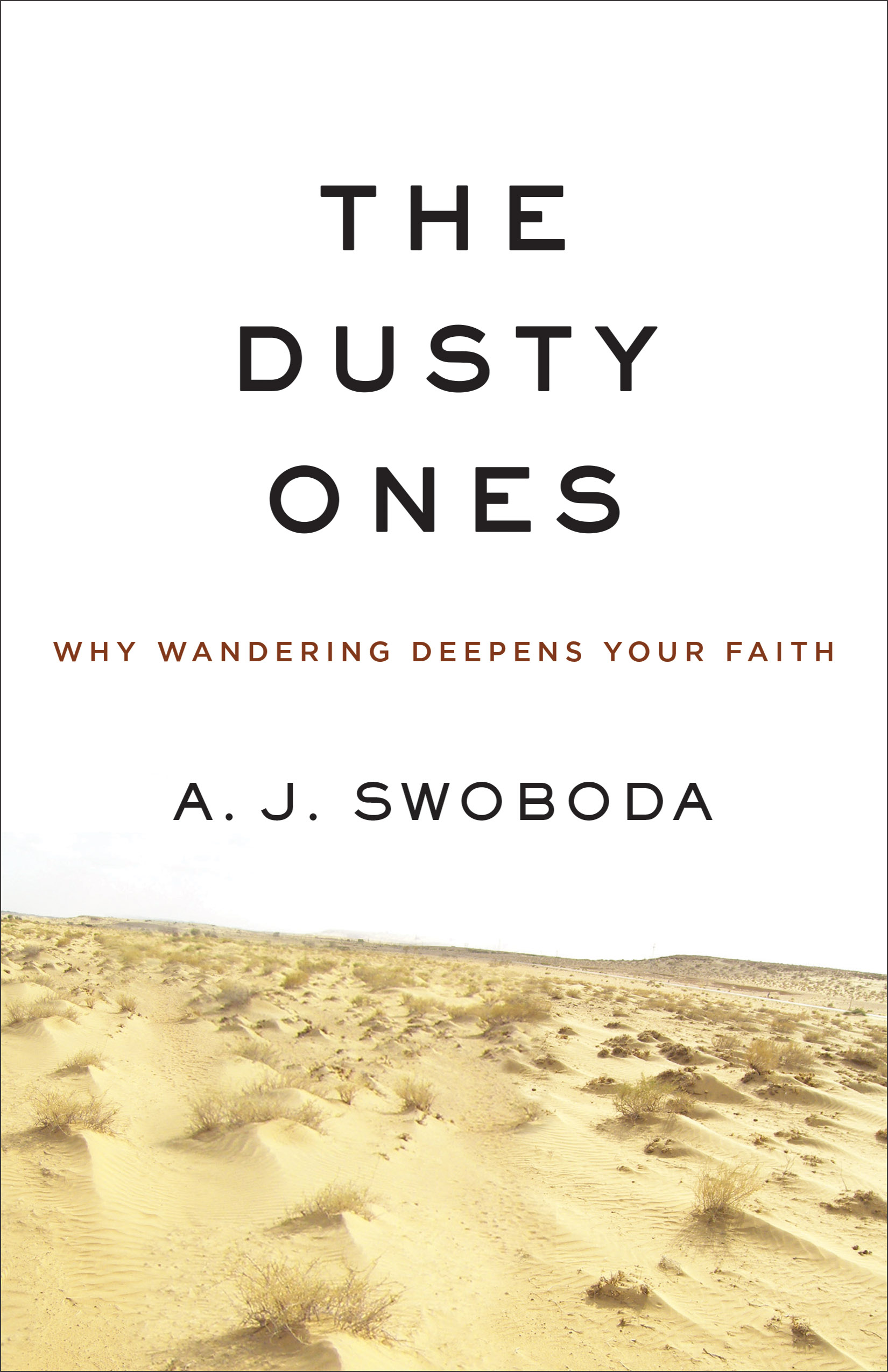 The Dusty Ones: Why Wandering Deepens Your Faith A.J. Swoboda (Baker Books) $15.99 I named this as a spiritual formation sort of book to be read during Lent when it first came out a month ago. I raved about A.J.’s A Glorious Dark noting that it is honest and raw, even, about our doubts and pains, the darkness that we know and that we attend to especially during the Holy Week rituals and the tridium. He’s a fun and colorful writer and a good storyteller but he’s also that kind of guy, naming real world stuff and inviting us to an authentic faith experience, even if at times (gloriously) dark.
The Dusty Ones: Why Wandering Deepens Your Faith A.J. Swoboda (Baker Books) $15.99 I named this as a spiritual formation sort of book to be read during Lent when it first came out a month ago. I raved about A.J.’s A Glorious Dark noting that it is honest and raw, even, about our doubts and pains, the darkness that we know and that we attend to especially during the Holy Week rituals and the tridium. He’s a fun and colorful writer and a good storyteller but he’s also that kind of guy, naming real world stuff and inviting us to an authentic faith experience, even if at times (gloriously) dark.
I named this one as a broader sort of book, but similar. As you can tell, and as I explained, it picks up the theme of wandering, and what it means to wander well. (I cannot help but note that the word sounds a bit like wondering — curiously asking — and then there’s that song “I Wonder as I Wander.”) So this is about being honest about deep stuff, about real questions, and about moving into those seasons and places when we are restless, doubtful or questioning. The road may be “always bumpy” but Swoboda says it is “always worthwhile.”
I wasn’t sure this book fit my theme — five books about disenchanted faith or evolving faith stories and five books of theology that might offer ballast and a framework for those who are seeking or evolving. This is perhaps even an example of the former, not the later. Yes, there are stories here, some about hard times, about restlessness, even a chapter called “Displacement.” In a way, this very much represents the sorts of longings and rejection of easy answers expressed in books like Out of Sorts or Night Driving.
However, The Dusty Ones is not telling of the awkwardness of bad faith or offering stories of shifting away from childhood certainties, it is a positive proposal for how questioning and wandering can be good. There is plenty of solid thinking here, good teaching about a Biblical vision and imagination, and theology of the sort that is formative and encouraging. It invites dusty journeys, honors those times when we feel lost, and doesn’t back off of faith that is provocative. But at the end of the day, as they say, being dusty is to be close to Christ, to be like most Bible characters, to be on the road with a lived and lively faith. He looks at our idols our “invisible loves” (he’s been reading Jamie Smith) and he invites us to walk, to go, to follow along that pilgrim way.
I like that the memoirist Seth Haines (recovering addict and author of the award-winning Coming Clean: A Story of Faith) says
A.J. Swoboda is the kind of pastor, writer, and theologian today’s church desperately needs. Capable and engaging, he has a bent toward vulnerability that is simply honest and beautifully human. And it’s this human touch that makes The Dusty Ones a unique, well-rooted, and spiritually nourishing work. If you’ve experienced your own desert seasons or periods of wandering, this book is Swoboda’s gift to you.
Can you see why I again recommend this, listing it here, in this list. Some of the first books lament the lack of room their legalistic churches gave for those who wander, or even wonder. The evolving shift away from fundamentalist paradigms the increasing jadedness about conventional religion is partially because such rigid faith systems can sometimes become unhealthy, covering up doubt and the “beautifully human” plight of our limits and foibles. And those congregations that aren’t fundamentalist, but still insist on wearing our “Sunday best” and protecting their status quo, can also implicitly discourage those who ask questions. If churches — more liberal or more conservative — used resources like this utterly Biblical, theologically fine book, God’s children would be better served, people would flourish in faith development that is rigorous without being rigid, open-minded without being shallow, truthful without fostering pride, honest about being lost and earnest about being found. I’m a fan of this kind of serious faith formation, theology on the road, spiritual development for the heart and mind, situation smack in the questions of a hurting, wandering world. This is highly recommended.
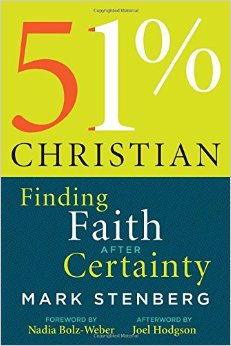 51% Christian: Finding Faith After Certainty Mark Stenberg (Fortress Press) $16.99 Well, I’m not sure what to say about this — it isn’t everyone’s cup of theological tea, I suppose. Stenberg is a founding pastor of two innovative, emerging churches, House of Mercy Church in St. Paul, Minnesota and Mercy Seat Lutheran Church in Northeast Minneapolis. This is a recent release from the “Theology of the People” series (edited by Tony Jones) and carries a very moving foreword by Nadia Bolz-Weber. So that might help you place it.
51% Christian: Finding Faith After Certainty Mark Stenberg (Fortress Press) $16.99 Well, I’m not sure what to say about this — it isn’t everyone’s cup of theological tea, I suppose. Stenberg is a founding pastor of two innovative, emerging churches, House of Mercy Church in St. Paul, Minnesota and Mercy Seat Lutheran Church in Northeast Minneapolis. This is a recent release from the “Theology of the People” series (edited by Tony Jones) and carries a very moving foreword by Nadia Bolz-Weber. So that might help you place it.
But, don’t be fooled, thinking that its out-side-the-box, radical approach is too eccentric to be unhelpful. Stenberg may be iconoclastic and Russell Rathbun of House of Mercy may say he is “the funniest theologian I know” but this slight goofiness aside, this is a book grounded in pretty classic mainline Protestant formulations. It is laden with footnotes including one mentioning that Stenberg weeps — every time he says — that he reads Karl Barth on freedom. Now that, my friends, is commendation for a theological author, if you ask me: he doesn’t say he believes Barth is right about everything, but he knows enough about him and cares enough about these deep things that the dense Swiss thinker makes him weep. That’s a guy worth reading.
Debbie Blue, author of two great collections of exquisitely edgy sermons and the extraordinary Consider the Birds says “Stenberg is a brilliant theologian. In 51% Christian he makes some of the most graceful and beautiful theology you could ever imagine extremely accessible without sacrificing depth and complexity.” Another reviewer says the author “takes you on a wild ride across theological terrain few are willing to enter.” Rathbun says he’s funny, but he also says he’s “the smartest theologian I know.”
This guy knows his theological stuff, classic, contemporary, radical. He often quotes Dale Allison (a Girardian), draws on the genius systematic theology of James William McClendon, and happily appreciates the Canadian John Douglas Hall. And St. Thomas Aquinas and (naturally) Martin Luther.
And, I might add, the book makes some pop culture allusions, from Lewis Black to Bruce Cockburn to Malcolm X.
Pastor Stenberg has chapters with titles like “De-Greekifying the Divine, or How to Quit Thinking About God” and “Why Your Theory of Atonement Sucks.” I particularly liked “How the Cheatin’ Heart of Modernity Double-Crossed the Doctrine of Revelation.”
Okay, this isn’t J.I. Packer or John Stott or Abraham Kuyper; it isn’t even close to the previously mentioned authors named above, contemporary as they each are. But if we are inviting congregations or people to read serious-minded, practically-written, interesting theology that might make sense, moving away from nonessential dogmatism and heavy-handed, overly scholastic systematics, then this kind of neo-orthodox, very contemporary, provocative stuff should be part of that conversation. It seems to be helping some along the way, and even if it isn’t fully conventional, it is asking good, good questions, inviting answers that can point us to faith that doesn’t have to be cynically discarded or evolved out of with hurt and confusion. Let’s wander and wonder together, finding Biblical faith after unhelpful commitments to wrong kinds of certainty.
BookNotes
DISCOUNT
ANY ITEM MENTIONED
10% off
order here
takes you to the secure Hearts & Minds order form page
just tell us what you want
inquire here
if you have questions or need more information
just ask us what you want to know
Hearts & Minds 234 East Main Street Dallastown, PA 17313 717-246-3333
